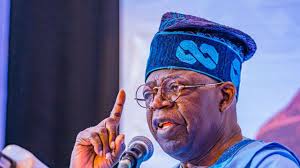Features
The president’s palliatives

By Abiodun Komolafe
Not long ago, Adeola Olatunde (not his real name) fell ill and was admitted to hospital. At a
point, his condition became so critical that help had to be sought from public-spirited individuals.
Eventually, former Governor Gboyega Oyetola of Osun State heard about it and took up the
challenge. Nigerians remain grateful to the Iragbiji, Osun State-born politician for this
benevolent act.

Obviously, Olatunde was fortunate because a Good Samaritan intervened when help was most
needed; otherwise, the story would possibly have been worse. But then, his case was not that of
one indolent beggar or non-possession of ‘a second address’ – as some unreconstructable
naysayers would always want the people to believe. His sin was to have worked as a political
appointee for two previous governments in one of the states in the Southwest.
As we speak, Olatunde is being owed arrears in salary running into millions of naira, including
the November 2022 salary deliberately seized by the incumbent governor; and ditto for others.
Nigerians may ask ‘why?’ Well, the answer is that a ‘Pharaoh, which knew not Joseph’, is now
in the saddle and the best way to exercise raw power is to deprive those who worked with his
predecessors in office their legitimate earnings, even when such aides were not known to be
partisan politicians. And, typical of Nigerians, they’ve continued to look the other way!
Without doubt, Olatunde’s case is one sad reminder of the fear of the future. It is a reflection of
why people get into office, instantly try to convert as much resources as they can into personal
use because ‘no one knows tomorrow’.
As our friend was fighting for dear life, the Federal Government was said to have secured
legislative approval for N500 billion for palliatives to cushion the effects of the fuel subsidy
removal on Nigerians. About the same time, the National Assembly was also said to have
allocated N70 billion, also for buying palliatives for its members. Needless to repeat that some
Nigerians viewed these actions as repugnant to the mood of the nation and the sensitivity of
Nigerians! To them, there ought to be a break from the tradition, where the norm has been
wrong.
Thankfully, President Bola Tinubu has ordered a review, a step that has portrayed him as a
listening leader “whose ears will not be dull to the views expressed by the citizenry”. Indeed, that
rare demonstration of empathy was emblematic of a government that’s determined to redefine
and broaden governance. It’s a confidence-building strategy which showed that Nigerians did not
waste their votes.
Those who did not understand Karl Marx’s position on capitalism would always say that Marx
fought the capitalists until he breathed his last. No! The capitalists were rather happy that Marx
was fighting them because he was always highlighting the excesses of capitalism; and they (the
capitalists) were able to rise up to the highlighted challenges. So, they saw him as the greatest
friend of capitalism. In Nigeria, capitalism’s major problem is wickedness on the part of its
adherents. In order to prevent a repeat of the past therefore, systems that are sufficiently strong
and robust should be put in place because ‘there’s more to the matter than someone
understands’.
Discreet investigations have revealed that Nigerians love their president. They want him to work
for them. Nonetheless, they are beginning to lose their patience. As far as they are concerned, the
present piecemeal policy approach may not continue to work. The palliatives issue for the
lawmakers, if not well-managed, may also dent the president’s image. Why? To them, Tinubu
has asked Nigerians to tighten their belts; and Nigerians are trying hard to cope. So, if they must
sacrifice, it has to go round, not one-sided.
From the look of things, Nigerians are not interested in how the International Monetary Fund
(IMF) is faring. All they want to hear is why the pump price of a litre of premium motor spirit,
pms, now hovers between N620.00 and N750.00; why a ‘mudu’ of garri fetches between
N500.00 and N800.00; why a tuber of yam now costs as much as N4,000.00; and why a bag of
‘pure water’ sachets, which used to cost N150.00 before May 29, 2023, is now N250.00. They
want to know what the government is doing to mitigate the sufferings brought about by Mr.
President’s ‘subsidy is gone’ pronouncement as well as what needs to be done so that they won’t
be perpetual tools in the hands of the rich and the powerful.
Of a fact, Nigeria’s economic indices are threatening unsmiling, with the state of her financial
insecurity leaving mouths agape. In recent times, the exchange rate has been on the high side
more so as her economy is import-driven. As a matter of fact, fuel imports constitute about 91%
of Nigeria’s foreign earnings. The naira is also devalued; and inflation is said to have jumped to
22.79 %, the highest since 2005. Amidst these, 63% of Nigeria’s population is currently living in
multi-dimensional poverty. Though these are an indictment on the past political establishment,
Nigerians are not unaware of the implications of this arbitrariness. The more reason Tinubu
needs to come out with a comprehensive plan of action on how to tackle the problems at hand.
In a release by a United Kingdom-based charity organization, ‘Committee of Friends’ (CoF),
issues, ranging from the deplorable state of government hospitals to the law enforcement
agencies, were raised. For instance, the body, whose membership spreads worldwide, queried the
rationale behind the N500b for palliatives for the over-200 million Nigerians while a whopping
N70b would be for the same purpose for less than 500 national lawmakers. It also expressed
worries about the “stringent conditions” attached to the newly-introduced Education Loan
Scheme, saying it’s as if the government already knows “those to be given”. After all, “similar
loans are given overseas without any surety. After the completion of their studies, the
government provides the beneficiaries with employment opportunities which make it easier for
them to repay their loans.” Not done, CoF urged the Tinubu-led administration to provide the
traditional rulers with constitution-defined roles, wondering why ‘a man without a job will not
sell his forefathers’ land.’
Thank God Tinubu was able to “dialogue with Nigerians who voted him into office” especially
on the “conditional cash transfer to vulnerable households mostly affected” by the subsidy
removal, an arrangement whose implementation couldn’t have been guaranteed in the first place.
Besides, N8,000.00 cash gifts to the poorest of the poor and millions of naira to each of the
legislators would have sparked reactions and might even serve as a window of insults to the new
administration, if implemented. So, rather than pursue policies that have in the past not led us
anywhere, it is better such monies are deployed to the repair of one or two refineries and the re-
introduction of government-assisted mass transit schemes. What about agricultural products for
mass food production? These will help in reducing the cost of transportation as well as creating
employment opportunities, ultimately, creating a better economy.
A time like this calls for the repositioning of the National Orientation Agency (NOA). Presently,
there’s confusion in the land and a reinvigorated NOA has important roles to play in explaining
the government’s policy thrust to the populace.
In the last analysis, it will not be out of place for Tinubu to address Nigerians. Yes, we need to
hear our president’s voice to, at best, fight our fears!
‘Hope Renewed’ must be fulfilled; otherwise, there’s a country called Nigeria!
May the Lamb of God, who takes away the sin of the world, grant us peace in Nigeria!
*KOMOLAFE writes in from Ijebu-Jesa, Osun State, Nigeria (ijebujesa@yahoo.co.uk)

























